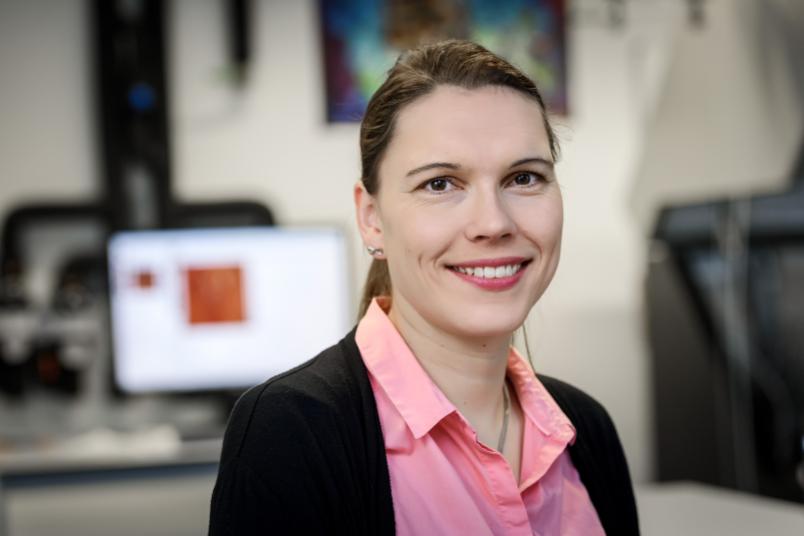
Chemistry
"I want my doctoral candidates to find attractive jobs"
It is harder for founders to get a company up and running in chemistry than in other fields. A new institution is intended to change that.
The “Start4Chem” business incubator is connected to the Cluster of Excellence “Ruhr Explores Solvation”, Resolv for short. It is part of the Start-up Center NRW, for the establishment of which RUB received funding from the state. In addition to her work as the head of the Research Group of Electrochemistry and Nanoscale Materials, Professor Kristina Tschulik is establishing Start4Chem.
Professor Tschulik, why is the Start-up-Center so important?
The chemical industry here in the Ruhr area is a very important economic sector; a beacon that offers many qualified jobs. If this should remain the case over the long term, technology-driven innovations are needed that may likely originate from research in natural sciences. The signs are pointing towards Chemistry 4.0. However, hardly any companies are currently being founded in chemistry from research institutions.
What is understood by Chemistry 4.0?
Chemistry 4.0 describes the change from chemical production processes to greater sustainability, with digitalisation and the recycling economy playing an important role.
This includes, for instance, sensors that continually measure, automatically process and, if necessary, correct process parameters such as temperature, pressure, and pH value. It may further save and compare such data across global production sites in order to identify indicators of soon-to-emerge failure before it happens.
It would thus be possible, for example, to identify maintenance needs at an early stage and avoid production downtime. Experts speak of predictive maintenance. Chemistry 4.0 ultimately contributes to conserving resources and using energy efficiently.
Why are there so few start-ups in chemistry?
The problem we have in chemistry is the so-called innovation gap: there are many researchers who make great inventions and also register patents. But before an invention reaches industry, it must first be tested in the laboratory, upscaled, then tested again, pass through approval procedures – and all of this takes time.
Unlike in the IT sector, for instance, you need more than just a good idea and a computer for this: laboratory equipment is expensive and the whole process takes a lot of time. In chemistry, it takes around five to ten years from applying for the patent to selling a product. Programmes to support company start-ups, such as Exist, usually cover the first few years of this. Then the gap comes.
How can the Start-up Center help here?
Start4Chem will help to close this gap. It offers founders laboratories, offices, contact to business partners and advice from professionals, who are also very familiar with the commercial aspects of setting up a company. They can help, for instance, to assess the success of an idea and plan which markets and which field of application could be addressed with it. They can also provide contacts and thus speed up the whole process. The center should also help to tap into further sources of funding. What’s more, we want to provide a network and meeting points with established companies, and all of this at the O-Werk facilities at Mark 51°7.
However, Start4Chem already starts before this. We also want to encourage young chemists to venture into business. The subject of starting a company will therefore be integrated into teaching as an integral part, not sporadically as usually done to date. Through contact with successful founders as role models, we also want to awaken an entrepreneurial spirit among the students and reduce their fear of failure.
But not everyone can be successful?
No, but you learn from mistakes, and we know from experience that people who have founded a company and failed either made a second – successful attempt or are coveted employees for major companies. They know: he or she has ideas and isn’t afraid to take chances.
Who can benefit from Start4Chem?
Anyone who concerns themselves with sustainable chemistry in the broadest sense. In other words, researchers from all over Germany who, for instance, are conducting research into smart sensors, more long-lived catalysts, battery technology, fuel cells or technologies that help to reduce CO2 emissions.
Besides your actual job, you are involved in launching the incubator. What drives you?
The time of academics researching in ivory towers completely detached from society is over, fortunately. I want the doctoral candidates that I train in the next 30 years to find attractive jobs here in the region. For this to happen, we have to do something now to get innovations off the ground and transfer them into our industrial companies.